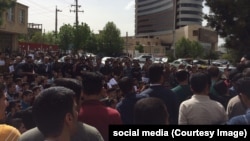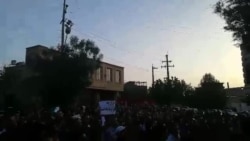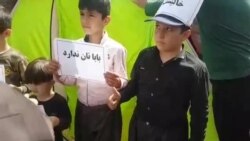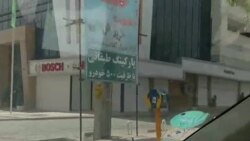Hundreds of Iranian Kurds have joined an anti-government rally in a northwestern border town in support of a general strike that has paralyzed the local economy for 12 days.
Residents of Baneh who contacted VOA Persian via social media shared images of what they said were around 1,000 people peacefully demonstrating outside a local government building.
WATCH: Demonstrators Chant Slogans Against Local Governor in Baneh
The crowd chanted slogans demanding the removal of Baneh’s governor. Residents accuse him of not doing enough to press Tehran to end a blockade of border footpaths that they use to carry goods from Iraqi Kurdistan into Iran for sale in their stores.
A lack of manufacturing in Baneh and other parts of Iran’s Kurdistan province has impoverished the population. Many residents have tried to eke out a living by carrying Iraqi goods across the border as porters, also known locally as kolbars.
Several Baneh residents said they attended a meeting Thursday with a visiting delegation of the central government in Tehran. They said Iran’s Deputy Industry Minister Mojtaba Khosrowtaj promised to consider reducing import taxes on local traders. But the attendees said they and other local delegates rejected the offers of the Tehran officials as too little. There were no immediate reports of the meeting in Iranian state media.
WATCH: Iranian Kurdish Children Hold Protest Signs in Baneh
At Thursday’s rally, some men and boys held signs calling for the border footpaths to be re-opened and saying they have no money or food to eat.
Shopkeepers throughout Baneh have kept their stores closed since April 15 in a prolonged general strike that is unprecedented in the region for its length. The strike has caused anxiety among some local residents who have struggled to buy and sell everyday goods.
WATCH: General Strike in Baneh Stretches into 12th Day
Iran’s official IRNA news agency quoted Baneh’s deputy governor Nejad Shahidi on April 15 as saying that the government blocked the footpaths at Iraq’s request to “bring order to border trade and preserve security in border areas.” Many residents have rejected that explanation because of what they see as Tehran’s deep influence over Iraqi affairs.
This report was produced in collaboration with VOA’s Persian Service. Michael Lipin contributed additional reporting from Washington








